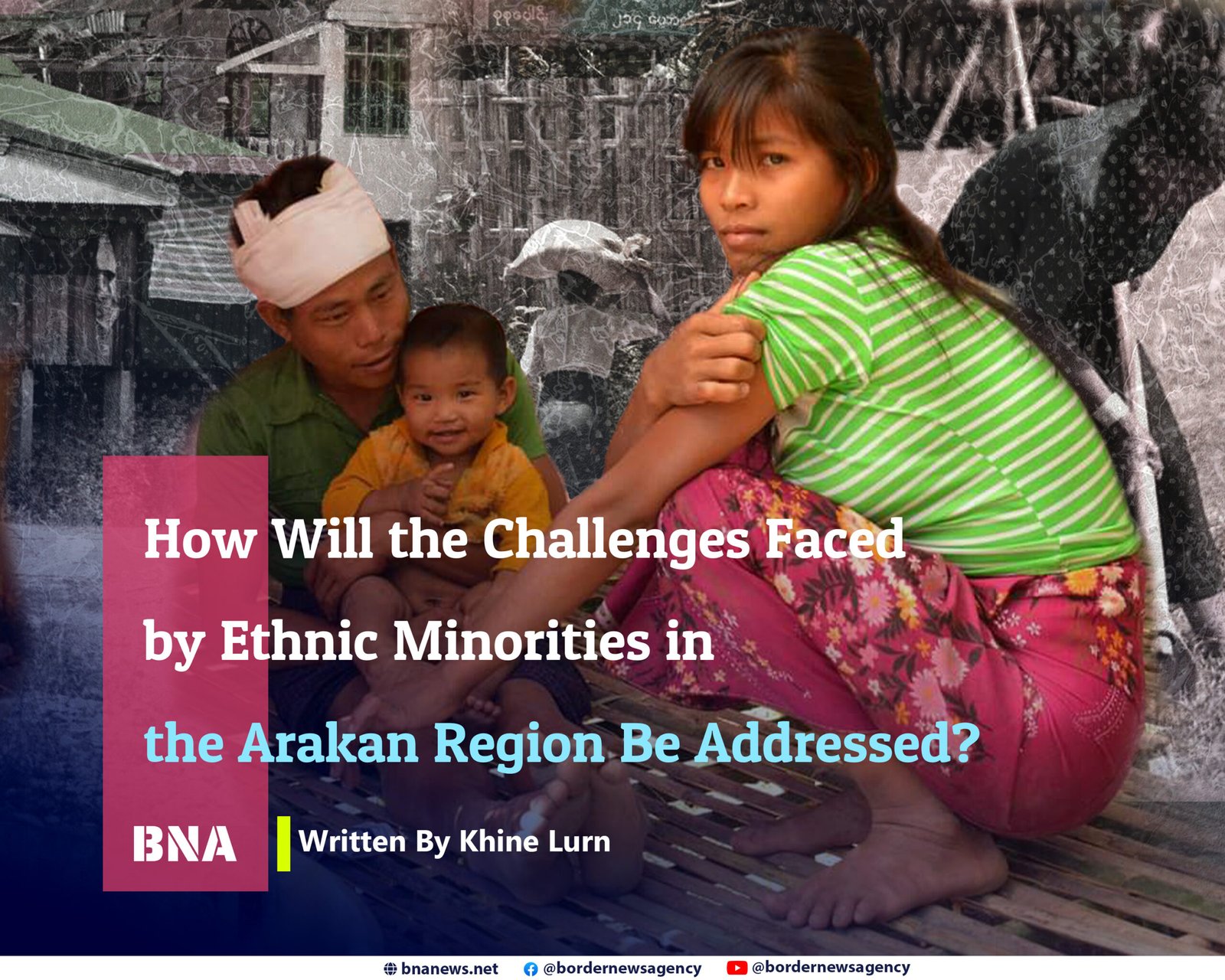Written By Khine Lurn
In the Arakan region, minority communities, mostly residing in remote areas with poor transportation infrastructure, have faced systematic discrimination by successive governments. As a result, they have been left behind in various aspects, including communication, healthcare, social development, economy, and education.
Within the already underdeveloped Arakan region, these minority groups have experienced even greater levels of underdevelopment, making their living conditions significantly worse.
After the outbreak of the decisive Arakan war, trade routes, medical supply chains, and communication networks have been cut off. As a result, minority families who were already living in remote and underdeveloped areas have seen their social, economic, and healthcare conditions deteriorate even further, reaching a critical state.
“Our communities are facing an unprecedented crisis. Everyone is suffering due to the impacts of war,” said U Hla Htun Kyaw, a former Member of Parliament and an ethnic Thet leader, in an interview with Border News Agency.
The Arakan Army (AA) has taken control of most townships in the Arakan region and is now governing under the Arakan People’s Revolutionary Government.
Under this new administration, the challenges faced by minority communities and the policies that will be implemented towards different ethnic groups remain matters of close observation.
Livelihood Challenges of Minority Communities
In the Arakan region, alongside the Rakhine ethnic majority, several minority groups such as the Mro, Khami, Thet, Daingnet, Kaman, and Maramagyi also reside, with most of them belonging to minority populations.
The Mro, Khami, Thet, and Daingnet primarily live in remote mountainous and riverbank areas, while the Kaman are mostly concentrated in Kyaukphru, Thandwe, and Rambre townships. The Maramagyi community, on the other hand, resides in urban townships such as Sittwe and Minbra.
These minority groups face significant challenges due to poor transportation infrastructure, making access to healthcare difficult. Additionally, many villages lack schools, depriving children of full educational opportunities, as reported by members of these communities.
In Arakan State, which has a population of over three million, the Mro, Khami, Thet, and Daingnet ethnic groups collectively number around 200,000. These communities primarily reside in Kyauktaw, Mrauk-U, Maungdaw, Buthidaung, Rathetaung, Minbra, Pauktaw, and Ann townships.
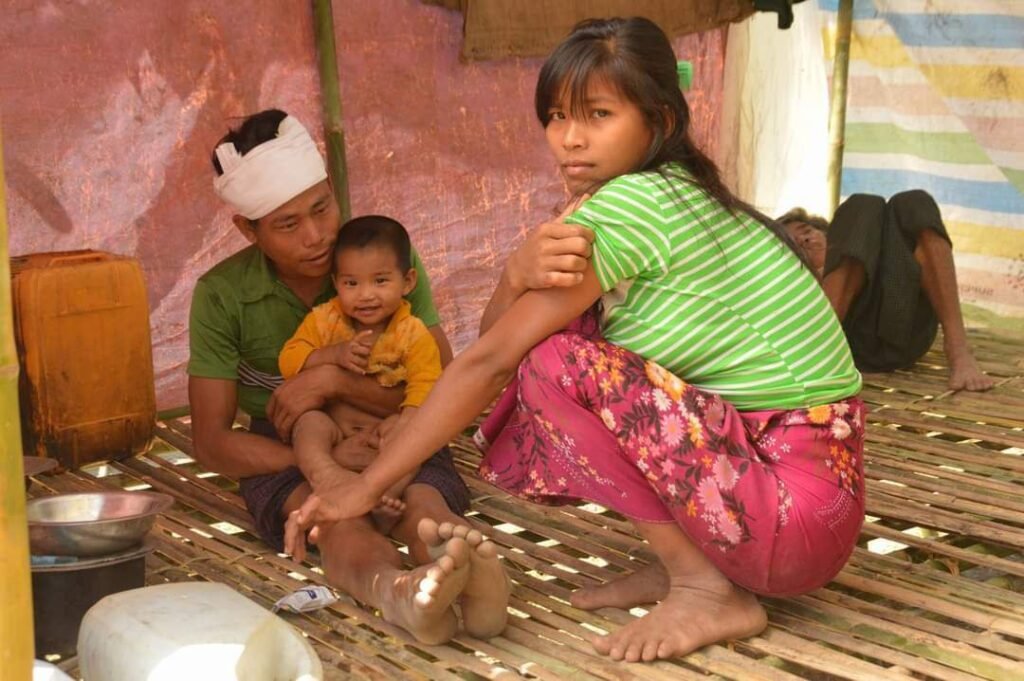
Most of their settlements are located in remote areas near forests, mountains, and riverbanks, far from urban centers. Due to the lack of proper transportation infrastructure, connectivity with towns remains a major challenge, according to members of these minority groups.
Their main transportation routes often involve crossing forests and mountains on foot, traveling by boat, or walking long distances. Only a few villages have access to roads where motorcycles or cars can be used.
In the remote mountainous, riverbank, and border areas, the primary livelihood of ethnic minority communities is agriculture.
They rely on selling their farm produce in nearby towns and larger villages to sustain their families. However, following the outbreak of the decisive Arakan war, many of their regular customers in urban centers and major villages have fled due to the ongoing conflict. As a result, these minority communities have lost their local markets, making it even more difficult for them to sell their products and sustain their livelihoods.
“Our farms are no longer fully operational, and even when we manage to grow crops, transportation has become a major challenge. If we produce large amounts of vegetables but there are no buyers, where can we sell them, and who will come to purchase them? Right now, we barely have any markets to sell our produce,” said Ko Pan Kyaw Du, a young Thet farmer from Maungdaw Township.
Due to skyrocketing costs of agricultural inputs and a shrinking market for their produce, many farmers from minority communities are struggling to continue farming. As a result, they are facing increasing livelihood difficulties.
“If we take the risk and invest heavily in farming, there’s still no place to sell our produce, so we end up with losses instead of profits,” farmers say.
“We spend a lot of money to grow crops, but when we can’t sell them, we lose everything. Instead of making a profit, all our money just disappears. The capital we invested is gone, and we are left with nothing. This is what many farmers like us are experiencing,” said Ko Pan Kyaw Du.
In Pauktaw Township, where the Khami ethnic group resides, many locals are struggling with their livelihoods as ongoing conflict has forced them to flee their homes, making it difficult to sustain their traditional means of living.
“There are almost no jobs left. Things were already tough before, but now it’s even worse,” said a woman from Pyuntaw Village in Pauktaw Township, home to many Khami people.
Following the clashes, many who previously had stable jobs have lost their employment or resigned, further worsening the financial difficulties faced by their families, according to ethnic minority workers.
A woman from Pauktaw Township, who previously worked in the education department under the military junta, shared that she lost her job when the junta took over, leading to a loss of income and leaving her unemployed.
“We were relying on my salary to support the family, but now with no work, our morale has dropped,” she said.
With the loss of their original jobs, many families are facing severe livelihood difficulties, and many are now forced to take up temporary or daily-wage jobs to survive.
“With the high cost of living, it’s not enough to get by on just one person’s earnings. Even the students and young people are struggling. Whether it’s farming, raising cattle, or doing odd jobs, how can we survive? We have to work harder and earn more money just to get by. This is how we are managing to meet our daily needs,” said Ko Pan Kyaw Du, a young Thet person from Maungdaw Township, commenting on the situation of ethnic minorities in the area.
Education Sector
In regions with very low development, ethnic minorities not only face difficulties in securing basic needs like food and clothing but also encounter significant challenges in healthcare and education.
In the Arakan region, there are around 500 villages where ethnic minority groups reside.
However, among these villages, the number of those that have secondary schools offering a curriculum that would allow students to enter university is fewer than ten, according to findings from Border News Agency’s research.
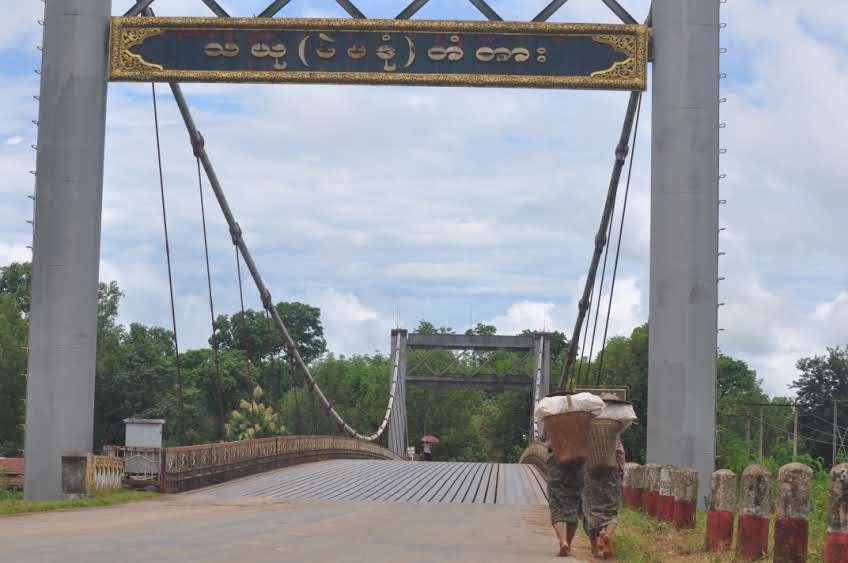
In villages where secondary education is available, the numbers are extremely low, and most of them only offer schooling up to the eighth grade or secondary level, meaning students can attend from primary school to the equivalent of high school graduation.
There are also many villages that do not have primary schools at all.
“There are many villages that do not have schools,” said a young person from a Mro and Khami village in the upper part of Sai Din Reservoir, Buthidaung Township, commenting on the situation in the Buthidaung region.
As a result, children in these areas have to walk long distances through unpaved roads, dirt paths, and flooded trails, crossing streams and rivers just to reach the villages where schools are located.
Many students have tragically lost their lives due to accidents while crossing dangerous paths, including drowning in flooded areas, and such incidents are still common in the Arakan region.
Due to these conditions, many children in ethnic minority areas do not receive a complete basic education, and many leave school at a young age without learning to read or write. This remains a significant issue in the region.
After the outbreak of conflict, the opportunities for children across the entire Arakan region to receive education have significantly decreased. For the already marginalized ethnic minority children, it has become even more difficult to access education.
The Arakan People’s Revolutionary Government (APRG) has been providing education from primary to pre-university (12th grade) levels in villages and neighborhoods. However, due to the high cost of textbooks, pens, school supplies, and transportation, as well as the growing financial difficulties faced by families, many children are unable to attend school anymore. This has further exacerbated the educational challenges faced by these children.
“The revolutionary government is not yet able to provide free education. Even teachers are being supported by the parents of students,” said a senior female teacher from the Arakan Education Department of the Arakan People’s Revolutionary Government (APRG).
The APRG has been gathering remaining teachers and educators in the region to open and run schools by village. However, in the ethnic minority villages, due to difficulties in finding teachers, only a few villages have been able to open schools, as locals have pointed out.
Therefore, there is a strong call for the strengthening of teacher capacity in those areas and for plans to ensure that children can receive a complete education. Locals emphasize the need for more teachers to be deployed to enable students in these regions to access full educational opportunities.
Healthcare
In regions where ethnic minorities live, access to healthcare is also fraught with challenges. These communities reside far from urban centers and townships with hospitals and clinics, making it difficult for them to receive healthcare even before the conflict.
Following the escalation of conflict, many hospitals and clinics have closed, and there is a severe shortage of healthcare workers. This has significantly worsened the situation, making it even more difficult for these communities to access medical care.
In these areas, even before the escalation of conflict, people had to travel long distances, sometimes up to 10 miles, through rugged paths or waterways to reach the nearest hospital or clinic. Many of the health dispensaries that once existed in these areas are no longer operational, making it even more challenging for people to access essential healthcare services.
“To visit a clinic, we have to cross a mountain. It’s not easy. It’s farther than before,” said a local youth from an ethnic minority in Ponnakyun Township, commenting on the situation in the area.
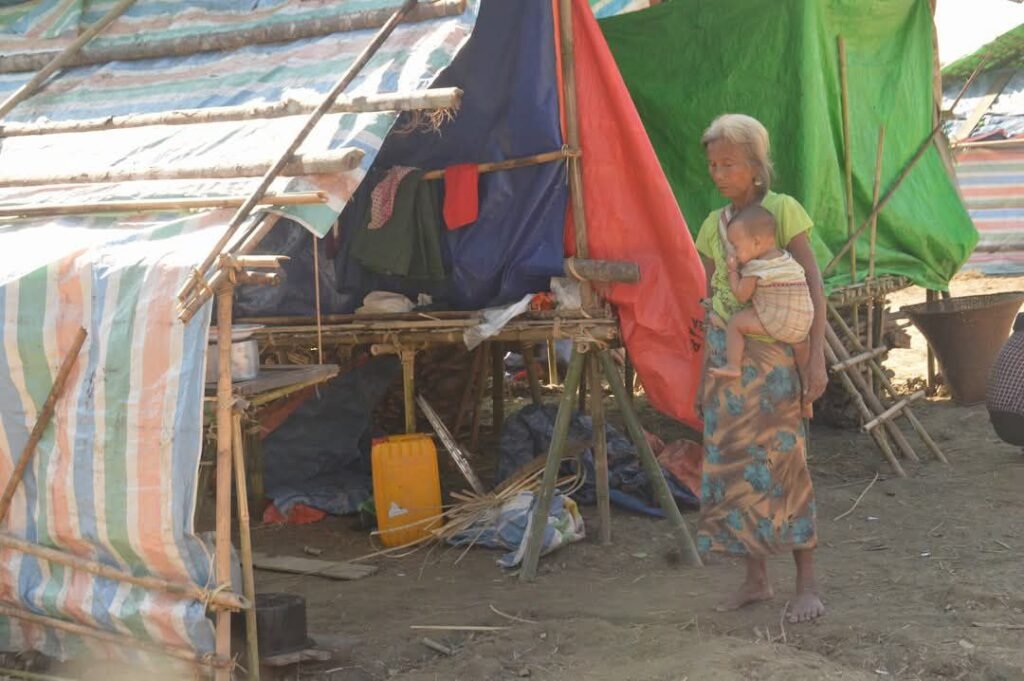
In the Arakan region, there were 19 hospitals, 54 township hospitals, 131 rural health centers (RHCs), 559 sub-health centers (SCs), and around 160 doctors. However, due to the Myanmar junta’s airstrikes, limited staff, and difficulties in accessing medicine, only a few clinics are still able to operate, according to the people of Arakan.
According to local sources, the number of healthcare workers, including doctors, has decreased by more than half, further exacerbating the challenges in providing adequate healthcare in the region.
“Even when it comes to medicine, access is limited. If you need to get it through Bengal, it could take at least a week or two to get the required medication. Moreover, you don’t even know which medicine to use, and the costs are unaffordable. The money spent on buying medicine often depletes the savings that people have carefully set aside,” said a young aid worker from Maungdaw Township, where many people are suffering from skin diseases.
The Arakan People’s Revolutionary Government has been providing healthcare services and placing health workers (such as doctors and medical staff) in areas inhabited by ethnic minorities. They have been able to offer health care services and medication, but they have been most effective for diseases like fever and coughs.
“They are doing the best they can. However, as you know, during this period, things are very difficult,” said a local resident from Ponnakyun Township.
“International humanitarian aid organizations have provided assistance to areas where ethnic minorities live, but due to difficult road access, they often can’t reach areas with poorer connectivity, as opposed to areas that have better infrastructure,” said a local Thet youth leader from Maungdaw Township, expressing the challenges faced in providing aid to minority communities. “Cars can’t reach, motorcycles aren’t convenient, and even walking has become more difficult than before, so there’s a lot of frustration. The organizations also can’t visit repeatedly.”
Military Conscription Amidst Difficulties
In such challenging circumstances, ethnic minority communities are still enduring the conscription calls from the Arakan Army (AA), according to them.
According to locals, in the Arakan-Bengal border areas of Maungdaw and Buthidaung, conscription calls have been made under the guise of protecting villages from armed Rohingya militants, with the aim of ensuring village security.
Minority groups welcome the call for military conscription, but on the other hand, they also express concerns that it disrupts their ability to meet basic needs.
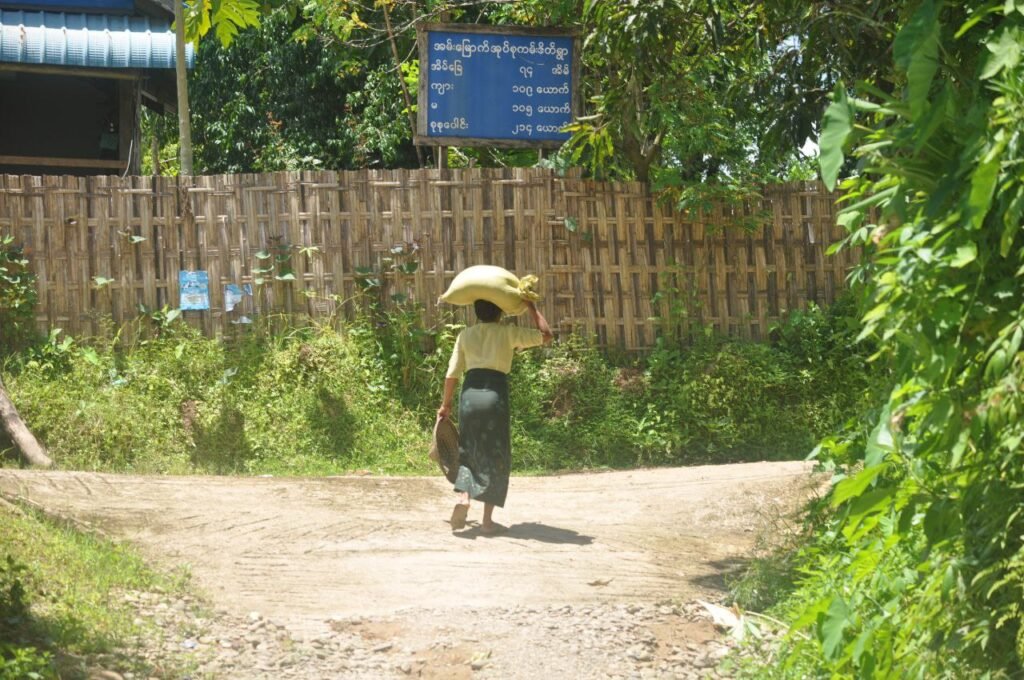
“In the place where we are working to make our country a free and independent nation, everyone has to be involved in their own way. But at the same time, there is the issue of ensuring food and shelter for our families, and that causes stress for the families,” said Ko Pan Kyoe Du, a young person from Maungdaw.
People in areas controlled by the Arakan Army report that the Arakan Army has started calling for military conscription.
When calling for military conscription, it is necessary to consider the family’s living conditions and the number of family members before granting exemption to those who should be exempt.
“For a family of one person, it’s manageable, but for those who have elderly parents or only one child, it’s difficult if they don’t have their child with them,” said a resident from Buthidaung.
If military conscription law is to be carried out, the governing bodies should provide warmth and support to the remaining families and offer necessary assistance, they pointed out.
A young Rakhine ethnic person from Maungdaw Township suggests, “The authorities should make us feel like we are not left behind, by offering warmth and support, and by making us feel that they are watching over us.”
The Arakan Army (AA) has not officially declared the National Defense Emergency Provision (NDEP), but people are reporting that the AA is calling on men aged 18 to 45 and women aged 18 to 35 from rural areas to join military service.
People close to the situation report that the Arakan Army (AA) has started calling for those who will join military service in all areas under their control, and the duration of military service is set to be two years.
Thet ethnic leader U Hla Htun Kyaw also commented on the military recruitment, stating, “During this period when the people are already suffering emotionally, it is crucial that the responsible organizations handle the situation as smoothly as possible. By managing it with care and attention, it will help improve the prospects for the future.”
Minority Groups Form Committee for Future Development
Despite the challenges of military conflict and communication blockages faced by people, the Arakan People’s Revolutionary Government has not completely abandoned the minority groups facing the most difficult situations.
The Arakan People’s Revolutionary Government and ethnic leaders have stated that committees focused on ethnic affairs, which include ethnic leaders, are being established and working on issues such as cultural practices, socio-economic needs, future development, and long-term sustainability.
The people of Arakan have stated that the committee was formed in December of 2024, towards the end of the year.
Although local ethnic group members are satisfied and encouraged by the formation and ongoing work of the committee, Thet ethnic leader U Hla Htun Kyaw has stated that there are concerns about whether it will remain more than just a paper-based initiative like previous governments, with fears that it might fade away.
A Thet youth from Maungdaw Township said, “The committee hasn’t been very effective so far. It’s also a time of revolution and a new beginning, so there are challenges.”
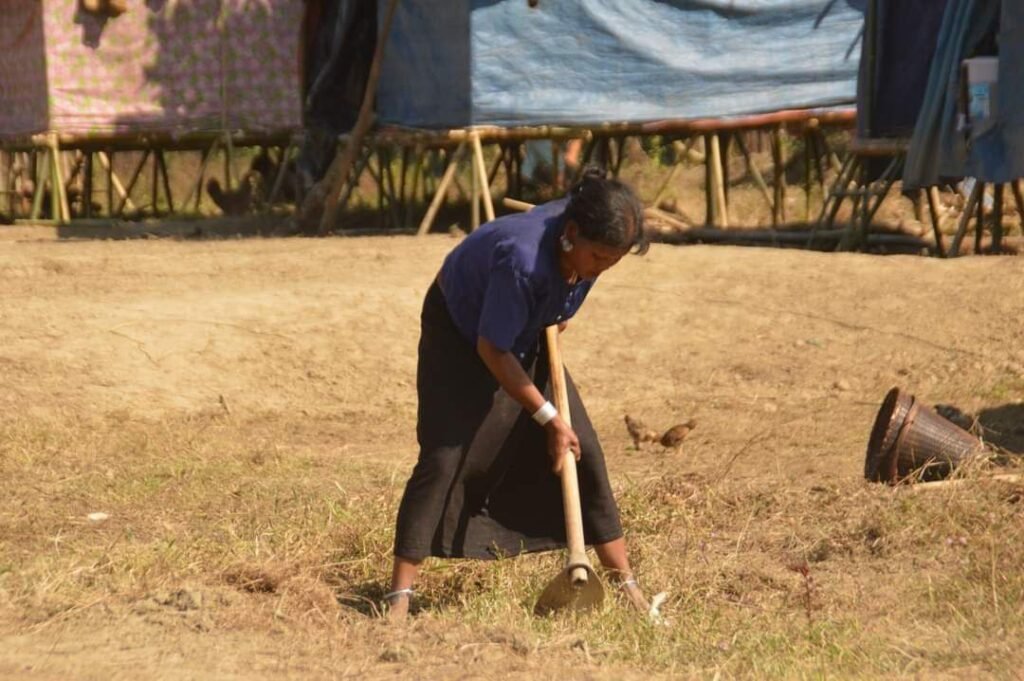
The Arakan People’s Revolutionary Government has been urged by minority youth and responsible individuals to provide effective assistance to the ethnic groups who have faced continuous division and discrimination under various eras of Myanmar’s government and are currently in the most challenging situations.
U Hla Htun Kyaw said, “If the people can clearly see that the ethnic groups living in this country are not abandoned but are being called to join hands and travel together on the same path, it would be even better.”
Ethnic leaders have pointed out that in order to ensure the development of minority groups, the most crucial actions include improving access to education, and gradually providing support in areas like healthcare and transportation.
U Lei Kyaw Aung, Chairman of the Khami Literature and Culture Association, told Border News Agency, “When education is lacking in any ethnic group, everything else in terms of economy and society falls behind. A nation is built through education, and when education falters, everything else, including the economy, will suffer.”
U Myat Htun, Director of the Rakhine Human Rights Defenders Group, also suggested that the Arakan People’s Revolutionary Government should govern and assist all people living in Arakan equally, without any ethnic discrimination.
He stated, “When undertaking development projects, if the Arakan People’s Government works to build the country without discriminating on ethnic lines and treats everyone equally, it will be a good approach in terms of unity. If this is done, the government will become a reliable institution for everyone in Rakhine.”
General Twan Mrat Naing, the commander-in-chief of the Arakan Army (AA), has also stated in interviews that everyone living in the Arakan region will be treated equally and governed in an inclusive manner. The public has reported that the land administration committees are also treating everyone equally and governing in a fair manner.
However, it remains to be seen whether this equal treatment will lead to long-term sustainable relations.
